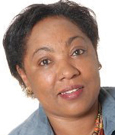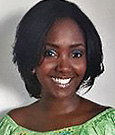Eight individuals were awarded travel scholarships allowing them to attend the IPOS/AORTIC Program (International Psycho-Oncology Society/African Organization for Research and Training in Cancer) and share their experiences and efforts toward improving the psychosocial care of patients with cancer in Africa. The program was held this past November in Durban, South Africa (see page 21). They included the following:
Anncommy Ekortarh, an independent consultant for international and national homestudy studies, reported that she spends 6 days a month in the city of Douala, Cameroon providing psychosocial services to patients with cancer. She believes that the importance of psychosocial services to cancer patients is gradually being recognized in Cameroon, but that hospital administrators need to be better educated about the benefits in order to move such services forward.
Elizabeth Akin-Odanye, a psychologist with the Department of Psychology at the University of Ibadan in Nigeria, reported that the Psycho-Oncology Society of Nigeria recently held its third national conference and workshop. The essence of the workshop was to build psycho-oncology teams in each of the geopolitical zones in the country and later expand it to include as many states as possible as manpower capacity increases.
Zippora Ali, National Coordinator at Kenya Hospices and Palliative Care Association, Kenya, reported that currently there is no unit specifically concerned with psycho-oncology, but that efforts are being made to integrate psychosocial services into palliative care. In 2013 in conjunction with other groups, Kenya Hospices and Palliative Care Association developed and launched a number of important guidelines and programs, including the national palliative care guidelines, national palliative care training curriculum, and a diploma in palliative care for nurses and medical students.
Fadipe Babatunde, MD, a psychiatrist at Lagos University Teaching Hospital, works with a psychiatrist there on psychosocial issues in cancer patients. Together they have carried out a study in which they found a prevalence of depression among 49% of cancer patients. The next step is to collaborate with the oncology team there and gather data to show the need for psychosocial services in patients with cancer.
Sokhna Ndiaye, a psychologist in Senegal, provides individual and group counseling for children, their families, and members of staff. Although she is the only psychologist on the unit, she works with others on a regular basis, including an art therapist, pediatric psychologist, and a family therapist to assist and counsel patients, family members, and staff.
Tshirelesto Molefe, is an oncology nurse working in the chemotherapy department of a private hospital in Botswana, but they also see patients from government hospitals on referral. She reported there is a need for collaboration with the government to see that patients are helped and there is much still to be done in regard to psychosocial services. Patients in need of such services are currently referred to another center.
Two other scholars, Kaimukilwa Diocles, of Tanzania, and Philip Odiyo, Kenya, were absent from the proceedings and/or joined following the meeting. ■






